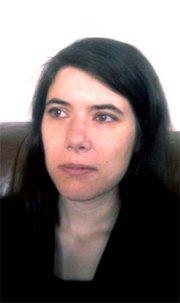The third Summer Course in Narrative Studies was held in August 2015. 36 PhDs, postdocs and seniors scholars took part. The overall rating of the course was 4,7 (on a scale from 1 to 5). Testimonial snippets from participants:
"a superbly organized course that put me in contact with highly qualified people and projects and that leaves me hungry for more”
“could not have been more useful to me”
“It was perfect”
“participating in this course has been a very valuable experience for me”
“Very rich in content […] good variety of academic backgrounds”
“My greatest of thanks to be able to be in a community that has such a comprehensive nature of persons, ideas and experiences”
“A high-quality, engaging, pleasantly informal course set in a dreamy location and full of interesting people. Best week in the last year”
Monika Fludernik
Fludernik is Professor of English at the University of Freiburg in Germany. Her publications include The Fictions of Language and the Languages of Fiction (1993), Towards a ‘Natural’ Narratology(1996), and An Introduction to Narratology (2009). She has (co-)edited several special issues of journals (onsecond-person fiction, Style 1994; on metaphor, Poetics Today 1999; on voice, New Literary History 2001; on German narratology, Style 2004). She has also edited a number of collections of essays: Beyond CognitiveMetaphor Theory: Perspectives on Literary Metaphor (2011); Postclassical Narratology: New Essays (with Jan Alber); In the Grip of the Law: Prisons, Trials, and the Space Between (2004, with Greta Olson); Diasporaand Multiculturalism (2003); Hybridity and Postcolonialism (1998). Her essays have appeared, among others,in Anglia, Arial, Diacritics, English Literary History, English Studies, Narrative, New Literary History,Poetica, Semiotica, Style, Textual Practice.
Fludernik is currently head of the research project Faktuales und fiktionales Erzählen. Differenzen, Interferenzen und Kongruenzen in narratologischer Perspektive and co-organizing The Summer Course in Narrative Study 2015.

James Phelan
James Phelan is Distinguished University Professor and Arts and Humanities Distinguished Professor in the Department of English at Ohio State University (US). His work focuses primarily on twentieth-century British and American narrative fiction. Much of his research has been devoted to developing a comprehensive rhetorical theory of narrative. He has written about style in Worlds from Words, about character and narrative progression in Reading People, Reading Plots, about technique, ethics, and audiences in Narrative as Rhetoric, about character narration in Living to Tell about It, and about progression (again) and reader judgments in Experiencing Fiction. His most recent book, Reading the American Novel, 1920-2010, offers rhetorical readings of ten canonical novels written across this ninety year period.
Since 1992, Phelan has been the editor of Narrative, the journal of the International Society for the Study of Narrative. Since 1993, he has been co-editor, with Peter J. Rabinowitz, and since 2010, with Robyn Warhol, of the Ohio State University Press series on the Theory and Interpretation of Narrative. The series has now published over 35 books.

Karin Kukkonen
Kukkonen's research explores the interactions between literature and the human mind. She has worked on the neoclassical rules of poetics (such as poetic justice), the ways in which they engage readers cognitively and emotionally, and how they shape the narrative strategies of the eighteenth-century novel. Her doctorate was on a contemporary emergent genre: the graphic novel and her doctoral research at the Universities of Tampere and Mainz developed a cognitive approach to comics and traced the impact of postmodernism on narrative strategies in twenty-first-century comics.
Her monograph Contemporary Comics Storytelling appeared in the Frontiers of Narrative Series with the University of Nebraska Press (2013) and the textbook Studying Comics and Graphic Novels with Wiley-Blackwell (2013). Other publications include articles on the cognitive dimensions of uncooperative narrators, quixotic readers, masquerades,and the deal with the devil in the Gothic novel, a co-edited volume on Metalepsis in Popular Culture (Narratologia - DeGruyter, 2011) and special issues of the journals Paragraphon "Reading Cognitively" (2014) and Style on "Second-Generation Cognitive Approaches to Literature" (forthcoming 2014).
Kukkonen serve in the steering committee of the European Narratology Network and the advisory committee of the project "A History of Distributed Cognition" at the University of Edinburgh.

Mark Freeman
Freeman is Professor of Psychology and Distinguished Professor of Ethics and Society at the College of the Holy Cross. His most recent book, Hindsight: The Promise and Peril of Looking Backward(Oxford, 2010), explores the idea that there is much that we can know about ourselves only in retrospect: looking backward over the personal past, we can frequently see what we either could not or would not see earlier on as well as discern the contours of our unfolding life stories.
Freeman is also the author of Rewriting the Self: History, Memory, Narrative (Routledge, 1993), which received the Alpha Sigma Nu National Book Award in 1994; Finding the Muse: A Sociopsychological Inquiry into the Conditions of Artistic Creativity (Cambridge, 1994), which was designated an Outstanding Academic Book by Choice magazine in 1995; and numerous articles on memory, self, autobiographical narrative, and the psychology of art and religion. He has recently completed a book titled The Priority of the Other: Thinking and Living Beyond the Self, which seeks to complement his longstanding interest in the self with an in-depth exploration of the category, and place, of the other in psychological life.
Stefan Iversen and Henrik Skov Nielsen